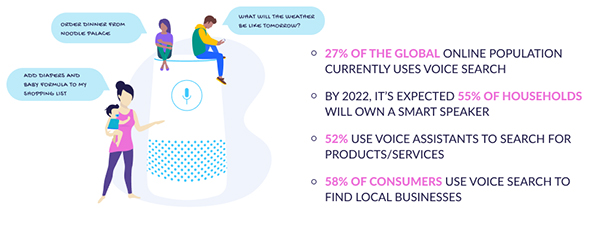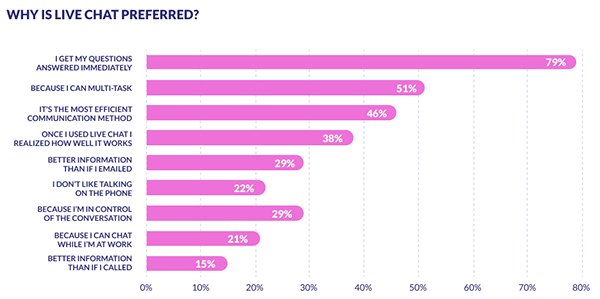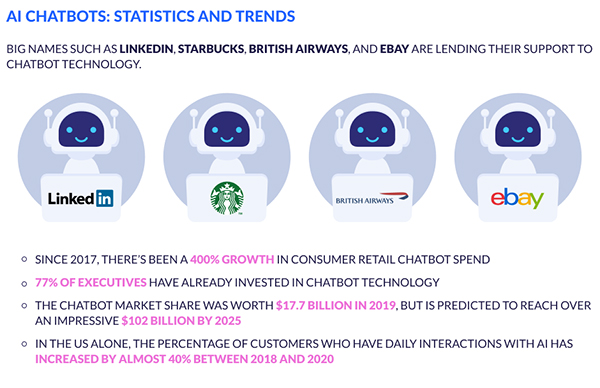Conversational Commerce technology is quickly becoming a major purchasing trend. Here’s how it’s changing ecommerce.
Ecommerce is booming.
This year, global ecommerce sales are expected to hit over $5.42 billion, a figure which in two years’ time – 2024 – is set to reach a whopping $6.38 billion.
So yes, ecommerce is booming – but did you know that it’s changing, too?
Virtual and augmented reality are coming to the fore as retailers look to offer increasingly immersive, intelligent shopping experiences. Mobile-friendly experiences are being prioritized, too – as are concerns around the kind of UX (user experience), accessibility, and omnichannel options ecommerce websites offer.
But one of the biggest drivers of ecommerce change is related to conversation – specifically, the point where conversation and selling meet. It’s called conversational commerce, and includes tools like virtual assistants, live chat features, and AI (artificial intelligence)-powered chatbots.
So just how exactly is conversational tech driving ecommerce change – and what can your online business learn from it?
“Hey Alexa – what’s a virtual assistant?”
Virtual assistants are digital applications that can recognize – and comprehend – voice commands, and then use that information to complete tasks.
These days, virtual assistants (think Google Assistant, Samsung’s Bixby, and Apple’s Siri) are built into most tech. You’ll find Siri talking back to you from any recent iPhone, Apple Homekit, MacBook Pro, or Apple Watch, and Alexa hanging on your every word through your Amazon Echo.
So what does any of this tech have to do with ecommerce?
Well, the fact is that the days of a user having to type a few words into Google to search for a product or service online are gone. Because of virtual assistants, customers can use their voice alone to search for companies, browse stores, explore reviews, and compare products.
This trend isn’t new, either – nor is it a flash in the pan. 27% of the world’s online population already uses voice search, while two in three people (65%) in the 25-49-year-old demographic chat to their devices at least once every day. What’s more, voice assistant interaction is expected to grow 113% by 2024, with voice-compatible devices on the cusp of outnumbering humans.

Scary for some…exciting for ecommerce business owners!
Because, with voice search already changing the ecommerce game, you’ll need to make sure that your site’s ready. Some of the ways in which you can optimize your online store for voice search queries involve:
When it comes to grabbing quick, effective customer support, there’s nothing quite like live chat. When the alternatives are waiting hours (or days) for an email response, scouring a knowledge base for the right article, or getting put on hold – with only Roy Orbison’s greatest hits for company – live chat is a godsend.
And it seems your customers would agree.
The overwhelming majority (91%) of consumers around the world want real-time assistance. That’s because live chat – a tool which allows your customers to strike up a direct line with your business through your website – is quickly becoming the most efficient communication method around.
With total user satisfaction ratings of 73%, live chat trumps the popularity of communication via email (61%), app (53%), snail mail (50%), social media (48%), phone (44%), and SMS (41%).
And it’s easy to see why live chat features are in such hot demand.
Not only does live chat allow customers to obtain immediate answers to their queries, it also enables them to multi-task, stay in control of the conversation, and grab higher quality information than if they called or emailed. It also helps phone-phobic millennials stay off the phone – and chat while working, instead!

But it’s not just your customers that stand to benefit from you implementing a live chat tool into your ecommerce site. It’s your sales, too.
Recent research suggests that having a live chat tool on your site can boost your conversion rate by up to a staggering 82%. Furthermore, the data implies that even a single reply through a live chat box can increase conversion likelihood by a whole 50% – big gains for something that’s so simple to do! Live Chat also can help drive other customer-focused areas of a business, such as loyalty programmes.
It’s something that Nolah Mattress’s Stephen Light has had the pleasure of experiencing firsthand, after introducing a live chat feature to his website:
“Sales grew by up to 25% after we implemented a live chat feature,” he told Website Builder Expert. “Our bounce rate also dropped by 38%, and our customer satisfaction metrics increased. The live chat feature has been a huge success, and shows our customers that we care about their experience, which engenders loyalty and admiration.”
If the data and trends around live chat are to be believed, it’ll play a pivotal role in continuing to shape the growth and development of ecommerce. Simply having a dedicated FAQs (frequently asked questions) page on your site – or providing a contact number – is no longer enough. Customers want to be served in real time, by a real person…and get real answers!
The third, final (and perhaps most drastic) piece of conversational tech that’s set to drive ecommerce change is the AI chatbot.
Chatbots function in a similar way to live chat. They offer real-time assistance, and can direct customers to a particular product or support article. The only thing they can’t do is, well… be human! But what chatbots lack in empathy or the ‘human touch’, they make up for in speed, accuracy, and scalability – and are cheaper to maintain to boot.
So what about AI chatbots is driving the winds of change in the world of ecommerce?
Well, the key strengths of AI chatbots lie not in the fact that they can simulate human interaction, or that they’re more compliant – and easier to update or make changes to – than their real life counterparts. The real implication for AI chatbots on the future of ecommerce is that they’re capable of changing how a customer navigates a website, helping to drive more conversions.
Rather than requiring customers to click through the entirety of a site to reach the specific product or service they’re looking for, AI chatbots can function as a kind of interactive ‘quiz’. Your site’s users will be able to utilize the chatbot to narrow down their search via size, price range, popularity, type, style, color, and availability – then add it straight to their basket to check out.
For your customer, the advantages are straightforward: less time spent trawling your website, tailored recommendations for products or services based on their unique preferences, and a less daunting experience overall. For you, the drawcards are equally clear: more engaged, loyal, and purchase-ready customers, and a smaller customer services team wage bill, too.
Not convinced? Just take a look at what the data’s saying when it comes to the future of AI and ecommerce… and the kind of companies that are already throwing their weight behind chatbots!

So what’s next for the future of ecommerce?
Well – while we don’t have a crystal ball to hand – we can make some educated guesses.
Machine learning and automation will play a huge role – as will emerging technologies, such as PWAs (progressive web apps). Millennials and Gen Z will have an integral role to play, while wider trends – such as the ongoing COVID-19 pandemic, and the general shift toward online shopping it underlines – will also make their mark.
But ultimately, it’s conversational tech that stands to leave the most emphatic – and enduring – impact on ecommerce’s future.
At its core, conversational commerce encapsulates all the modern ecommerce trends. It indulges – and negates the need for – millennial phone-phobia, and embraces the proliferating power of artificial intelligence.
Conversational tech – particularly live chat and chatbots – also satisfies the modern need for instant gratification. It allows your customers to multitask, too; to balance their interactions with your business alongside the day-to-day duties of their busy lives, and seek support in a way that’s most convenient – and comfortable – for them.
Yes, conversational commerce will shape the future of ecommerce, and – if you embrace it – the prospects of your online business, too.
The future’s conversing with you – right here, right now. Will you listen?

Rob Binns is the Content Manager for Website Builder Expert. When he’s not reading, writing, and editing, he can be found curled up in a sunny spot, or watching football in the company of close friends and cold beers.
Scott Ellyson, CEO of East West Manufacturing, brings decades of global manufacturing and supply chain leadership to the conversation. In this episode, he shares practical insights on scaling operations, navigating complexity, and building resilient manufacturing networks in an increasingly connected world.